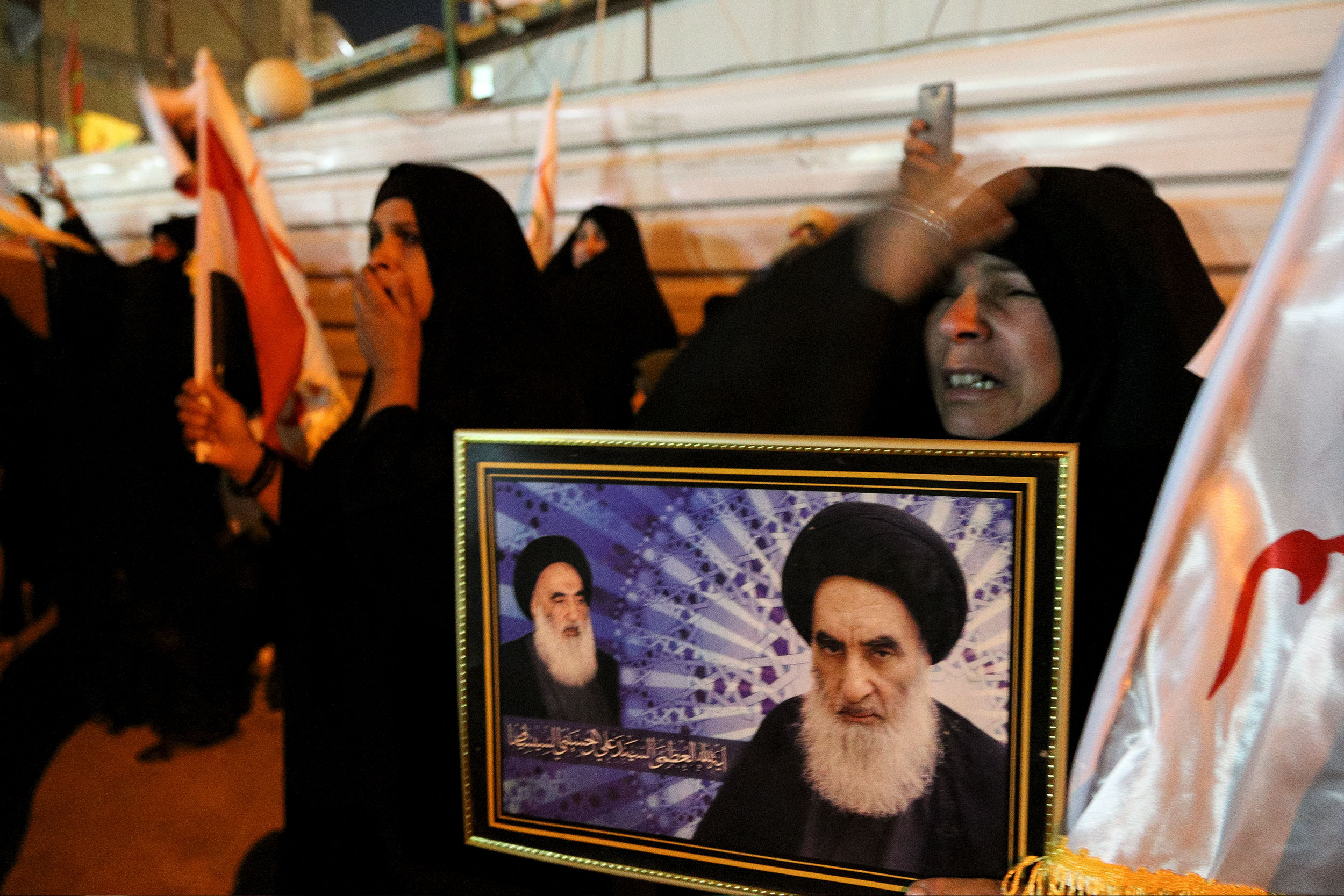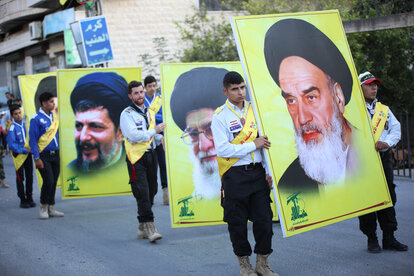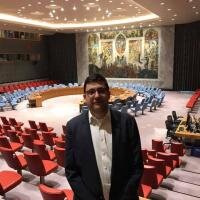MENAPOL Blog
The Dwindling Shadow of Iran

PART I
After several years of Iranian expansion in the region, reaching a high tide level of controlling four Arab capitals as stated by one of President Rouhani’s advisors, there is a growing consensus that Iran’s influence in the region is waning. Nowhere this is more prominent than in Iraq! In 2020, a new Prime Minister, Mustafa Al Khadimi has taken over, resisting Iranian pressure, and clawing back a more ‘Arabist’ stance for Iraq. Is this development spreading to Iran’s other beachheads, namely Lebanon, Syria, and Yemen? Or would it stop or even be pushed back in Iraq? This article will explore the geopolitically similarities between Lebanon and Iraq, especially in the last few years, trying to find an answer to that critical question. But what is even more interesting is that Iraq current developments and events, are mirrored in Lebanon half a year later. It almost seems as if Iraq today is Lebanon’s future!
Between Beirut and Baghdad
Of course, there is a lot that differentiate the two countries. Iraq is 40 times larger than Lebanon, with a population of 30 million, compared to Lebanon’s 6.5 million. Iraq is a resource rich country, and at one point, it was a major political player in the Arab world, having a formidable army, an extensive ballistic missiles program, and it even start work on a nuclear reactor. Iraq has also a different demographic and ethnic composition than Lebanon. It has a sizable Kurdish population, with a Shia majority, while Lebanon is roughly divided into thirds, Sunni-Shia-Christians.
Nevertheless, there are significant similarities between the two countries. First and foremost, both countries are multi-confessional democracies, that operate under a power sharing agreement, distributing the different powers and positions among the sects and ethnic groups. Additionally, both countries are in a tumultuous economic situation, with non-existent public services, widespread unemployment, and suffering from endemic corruption, that have led to sustained waves of protests and public unrest.
Battleground of regional and foreign power
Moreover, both countries are the battleground of regional power. Indeed, Iran, Saudi Arabia, Turkey, and even the United States are heavily involved in Iraq, fighting for influence and control. Iran has been spending significant blood and treasure to expand its control in Iraq, in order to extend its Shiite crescent, and the resistance axis in that country and further afield. Meanwhile, the US and KSA have been trying
to thwart Iran and put a stop to it extension in the region. Additionally, the US has significant interest in Iraq, where it spent trillions of dollars trying to impose a democratic government, and safeguard its interests.
Similarly, Lebanon has been historically a regional battleground, as the old saying goes “when clouds gather in the middle east, it rains in Lebanon!”. Nowadays, Iran, Turkey and the West are all maneuvering to improve their position and those of their allies in Lebanon. Iran has spent billions on strengthening Hezbollah, and its military and economic clout in Lebanon. Meanwhile, the KSA was also heavily involved in supporting its own Lebanese coalition, with the help of the US and Western countries. However, in the last few years the KSA and the Gulf have lost interest in Lebanon, while the US is still spending more than 200 million a year on the Lebanese Armed Forces, totaling more than 2 billion since 2006. Similarly, the European and other western countries have been paying billions in support of the State, UN agencies, and the million plus Syrian refugees.
Another similarity is that with this imbalance in available support, as the West and the US spend money on the state and not directly on their allies, while Iran directly fund its proxies, supplying them with money, materials, weapons, and even food staples. Thus, Iran and its proxies have been enjoying a lot of influence in the two countries. This has led to the formation of a large pro-Iranian political coalition, made out of different parties, that is supported by several pro-Iranian militias, with some that are fully funded and supplied and even controlled by Iran, in both countries.
Moreover, Iran has been trying to extend its own religious version of Shia (velayat el faqih) in the two countries, despite the presence of competing interpretation and main religious authorities (Grand Ayatollah Ali al-Sistani in Iraq and the late Muhammad Hussein Fadlallah in Lebanon). Indeed, these religious figures have been trying to strengthen their base of support and communities against Iran, pushing to move their respective countries away from the control of Iran and its Velayat el Faqih religious jurisprudence.

Iranian Militias
As previously mentioned, Iraq and Lebanon suffer from an inflated role of the Iranian supported Shiite militias. In Iraq, these militias were created to fight Daesh (Islamic State of Iraq and Syria) and are still present, threating peace and stability. They are grouped under Iraq's Popular Mobilization Units (PMU) or al-Hashd al-Shaabi were formed in response to a Shia fatwah calling for resistance to the threat of "Islamic State" in 2014.
The presence and earlier expansion of these militias in Iraq, has increased the oppression of the Sunni population, that feel that the State is unfairly treating them. They consider that the State is legitimizing these militias, and providing them with all the facilities and support they ask for, and even granting them a legal umbrella. While and in parallel, the State is immediately crushing any Sunni effort to organize or protest against such oppression, or even when calling for reform and services!
Even worse, there are reports that these militias have been active in crushing with deadly force the waves of demonstration and protests in recent months!
Meanwhile, in Lebanon Hezbollah’s military, political and even economic power has greatly increased. Many analysts compare the role of the party in Lebanon to the Iranian Revolutionary Guard Corps in Iran. It has the main say in most political and economic decisions, while enjoying a co-exclusivity (with Amal Movement) on internal Shiite issues. It is the only party that has the ability to push all the others to do its bidding. Despite all the economic woes, Hezbollah is still able to pay its adherents in Dollars, and provide their wider base of supporters with a social network, distributing basic food parcels, medicines, and even monetary assistance. Hezbollah has a sophisticated security operation running against Israel, and harshly stopping any internal dissent. There is no doubt that Hezbollah has a very strong military arm that is able to strike anywhere inside Lebanon and even regionally. Equipped with advanced weaponry, training and operational experience, Hezbollah gained those skills during the years it fought against Israel and the civil war in Syria.
Similarly, to Iraq and how the PMU attacked protestors, there has been reports linking Hezbollah and its supporters to the crushing and smothering of protests, especially in their areas of control, making sure that the Shia community will stay under their total control!
In conclusion, the geopolitical similarities between the two countries have been established in the first part of the article. Indeed, Lebanon and Iraq both are the battlefield for regional expansion and conflicting interests, Iran, the KSA, Israel, and even Turkey are fighting for influence and better positioning, meanwhile both countries suffer from a prevalent role of pro-Iranian Shiite militias with strong roles, that even threaten the state sovereignty itself! In part II, the recent events in Iraq will be explored in order to better understand foresee the possible medium- and short-term developments in Lebanon.
About the Author

